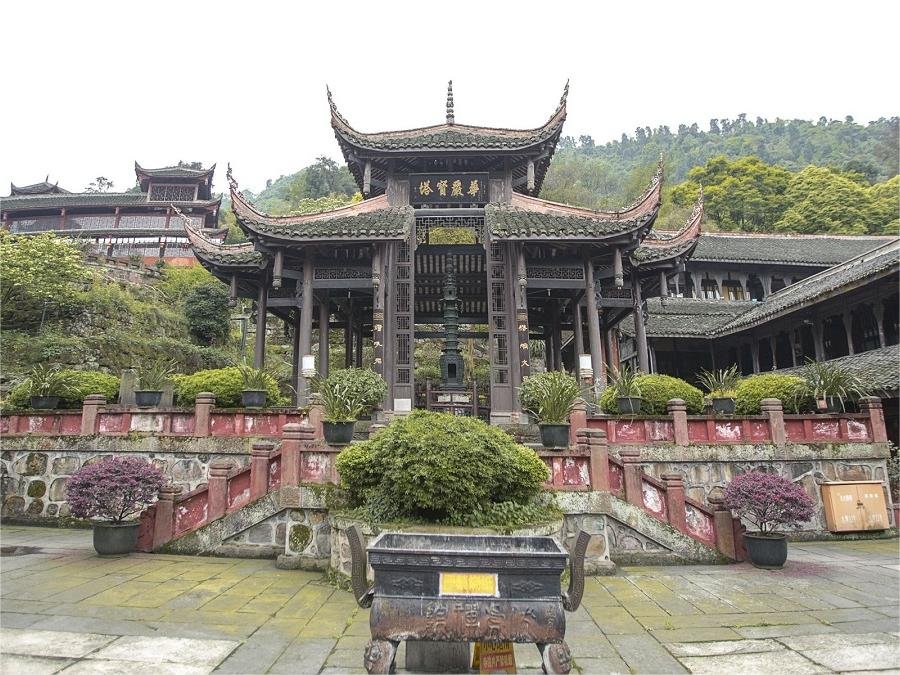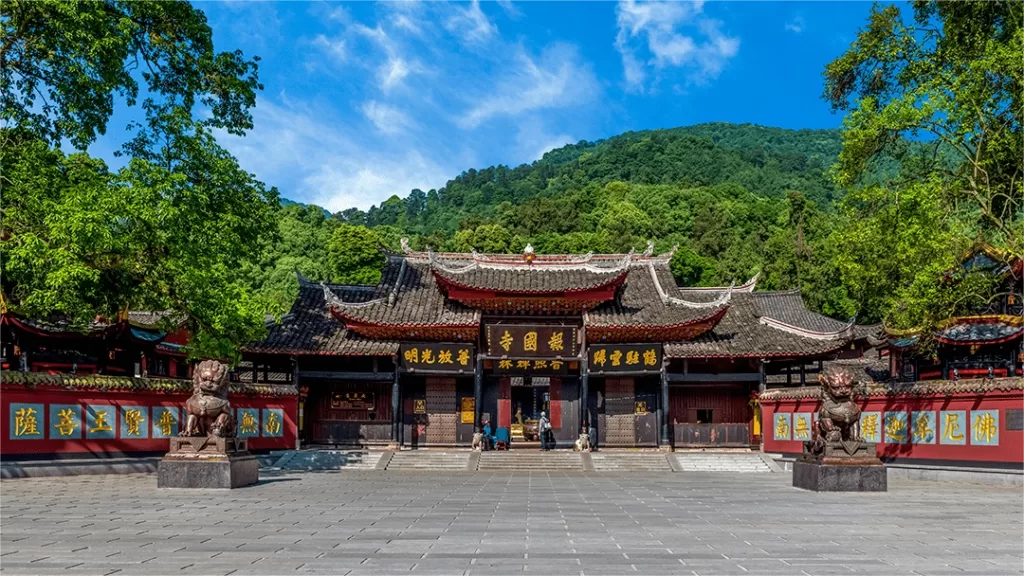Fuhu Temple in Mount Emei – Ticket Price, Opening Hours, Location, and Highlights


Fuhu Temple (伏虎寺) is situated at the foot of Mount Emei in Sichuan, China. Originally a small temple in the Jin Dynasty, it was rebuilt by Master Yun’an during the Tang Dynasty, with adjacent structures like the Dragon God Hall and Medicine Master Hall. In the Song Dynasty, it was known as the “Shenlong Hall.” Unfortunately, it was destroyed in the Ming Dynasty but later reconstructed in the eighth year of the Shunzhi era in the Qing Dynasty, renamed “Huxi Jing She.” Subsequently, due to the presence of tigers in the vicinity, the temple’s monks erected a revered victory banner to suppress them, leading to the renaming of the temple as “Fuhu Temple.”
Emperor Kangxi, recognizing the temple’s unique location in a narrow mountain valley with swirling air currents throughout the seasons, inscribed the name “Ligou Yuan” (Rid of Impurities Garden) for Fuhu Temple. This unusual atmospheric condition ensures that the temple’s rooftops remain free of debris and fallen leaves year-round. During the period of the Anti-Japanese War, Fuhu Temple served as the venue for the military training of the Emei Mountain Training Corps. It also provided refuge for the Faculty of Literature and the Faculty of Law from Sichuan University, which had relocated to escape the conflict. Receiving relatively few visitors, Fuhu Temple offers a tranquil environment, providing a sense of escape from the worldly hustle. Additionally, the temple provides accommodations and meals for those seeking a peaceful retreat.
Table of Contents
- Basic Information
- Location and Transportation
- Highlights of Fuhu Temple
- Useful Tips from Genuine Reviews
- Other Attractions in Mount Emei
Basic Information
| Estimated Length of Tour | 0.5 – 1 hour |
| Ticket Price | 6 RMB |
| Opening Hours | 8.00 -16.00 |
| Telephone Number | 0086-0833-5592424 |
Location and Transportation
Fuhu Temple is located 1 kilometer away from Baoguo Temple. It is situated at the confluence of the Yujia River and Huxi Stream, at the foot of Mount Emei, with an elevation of 630 meters.
To get there, you can either walk along the trails or take bus Emeishan 12 or 5 and get off at Fuhu Temple Stop (伏虎寺站).
Highlights of Fuhu Temple
Architectural Layout

Fuhu Temple, an architectural marvel, stands as a beacon of tranquility and spiritual grandeur. Nestled amidst lush mountains, this majestic temple showcases the essence of traditional Chinese design. Its symmetrical layout, intricate rooflines, and ornate decorations mesmerize visitors with their sheer beauty. The main hall, adorned with vibrant murals and delicate wood carvings, emanates an aura of divine grace. The graceful pagoda, soaring towards the heavens, adds an ethereal touch to the temple’s silhouette. Fuhu Temple’s architectural prowess effortlessly blends natural elements with intricate craftsmanship, inviting all who enter to immerse themselves in a world of serenity and profound reverence.
Huaya Pagoda

Huayan Pagoda stands to the left and above the main hall of Fuhu Temple. Cast in the 13th year of the Wanli era during the Ming Dynasty, this copper pagoda is a treasured symbol of the temple. A magnificent and immense structure, Huayan Pagoda was crafted nearly eight centuries ago in a single casting, standing at a height of 5.8 meters. Notably, the pagoda’s seamless construction without any visible joints adds to its exquisite beauty and historical significance as a key element of Fuhu Temple.
Arhat Hall

The Arhat Hall is situated at the highest point of Fuhu Temple, initially constructed during the Qing Dynasty. Inside, it enshrines 500 Arhats, though the hall actually houses 499 statues. Legend has it that the master sculptor of the Arhats was himself an Arhat, hence the collective term “Five Hundred Arhats.” These statues depict a variety of expressions – some compassionate, some sorrowful, and others fierce. At the center of the Arhat Hall stands a Four-Faced Buddha, believed to be an incarnation of Guanyin, showcasing a rich diversity of spiritual representations within this sacred space.
Stunning Scenery

Nestled amidst breathtaking natural splendor, Fuhu Temple boasts a captivating scenery that enchants the soul. Surrounded by verdant mountains, the temple offers a serene retreat where man and nature coexist harmoniously. Towering trees sway gently in the breeze, their leaves whispering ancient secrets. Cascading waterfalls cascade down rocky cliffs, their rhythmic flow creating a soothing melody. Lush gardens, adorned with vibrant blooms, provide a colorful backdrop to the temple’s tranquil courtyards. As sunlight dances through the branches and casts a golden glow, the picturesque landscape embraces Fuhu Temple, enhancing its ethereal ambiance. The stunning scenery of Fuhu Temple becomes a sanctuary of peace and beauty, inviting visitors to embark on a journey of spiritual reflection amidst nature’s magnificence.
Useful Tips from Genuine Reviews
Accommodation Options: Accommodation can be arranged at the lodging registration in Fuhu Temple. Rooms are often affordable, ranging from a few dozen yuan for dormitories to a little over 100 yuan for double rooms. Accommodations are typically in old wooden structures, and some rooms may have bathrooms located outside the main building. Showers are scheduled separately for men and women.
Sleeping Arrangements: If all beds are occupied, guests can bring their own bedding and sleep in the corridors. It’s essential to be prepared for potential moisture and cold, so take precautions for warmth.
Dining: Fuhu Temple provides vegetarian meals at noon for 15 yuan per person. Meal tickets need to be purchased in advance, and during the meal, phones should be on silent. Before eating, there is a 2-3 minute recitation. Guests are responsible for washing their own dishes and tidying up after the meal.
Timing to Avoid Crowds: To experience fewer crowds, it’s recommended to avoid visiting during lunar holidays such as the birthdays of Guanyin and Puxian. This can help ensure a more serene environment.
Behavioral Guidelines: Smoking is prohibited in the forest and ancient architectural areas. Open flames are also not allowed. Photography is permitted within the temple grounds as long as it does not disturb others.
Other Attractions in Mount Emei

Wannian Temple

Baoguo Temple


Monkeys In Mount Emei
Leshan Attractions, Sichuan historical site